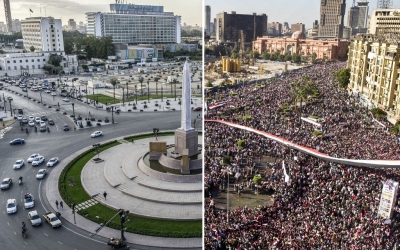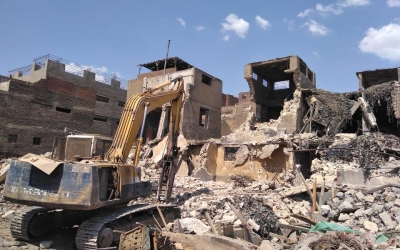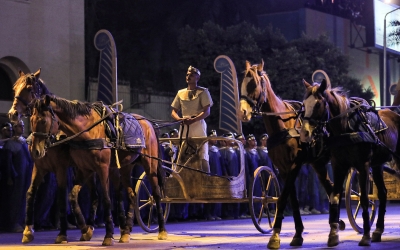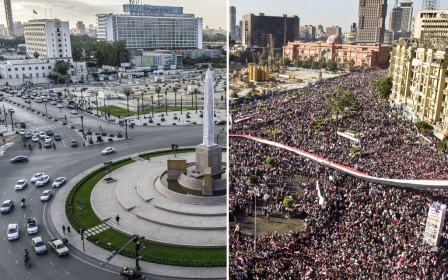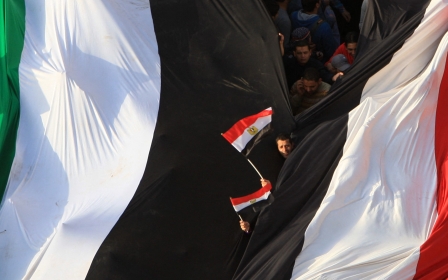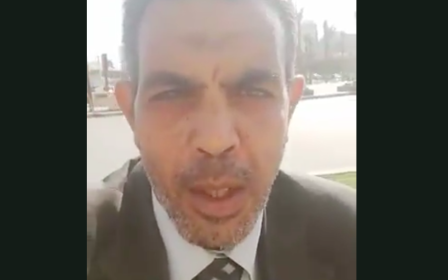Egypt to turn iconic Tahrir Square building into luxury hotel
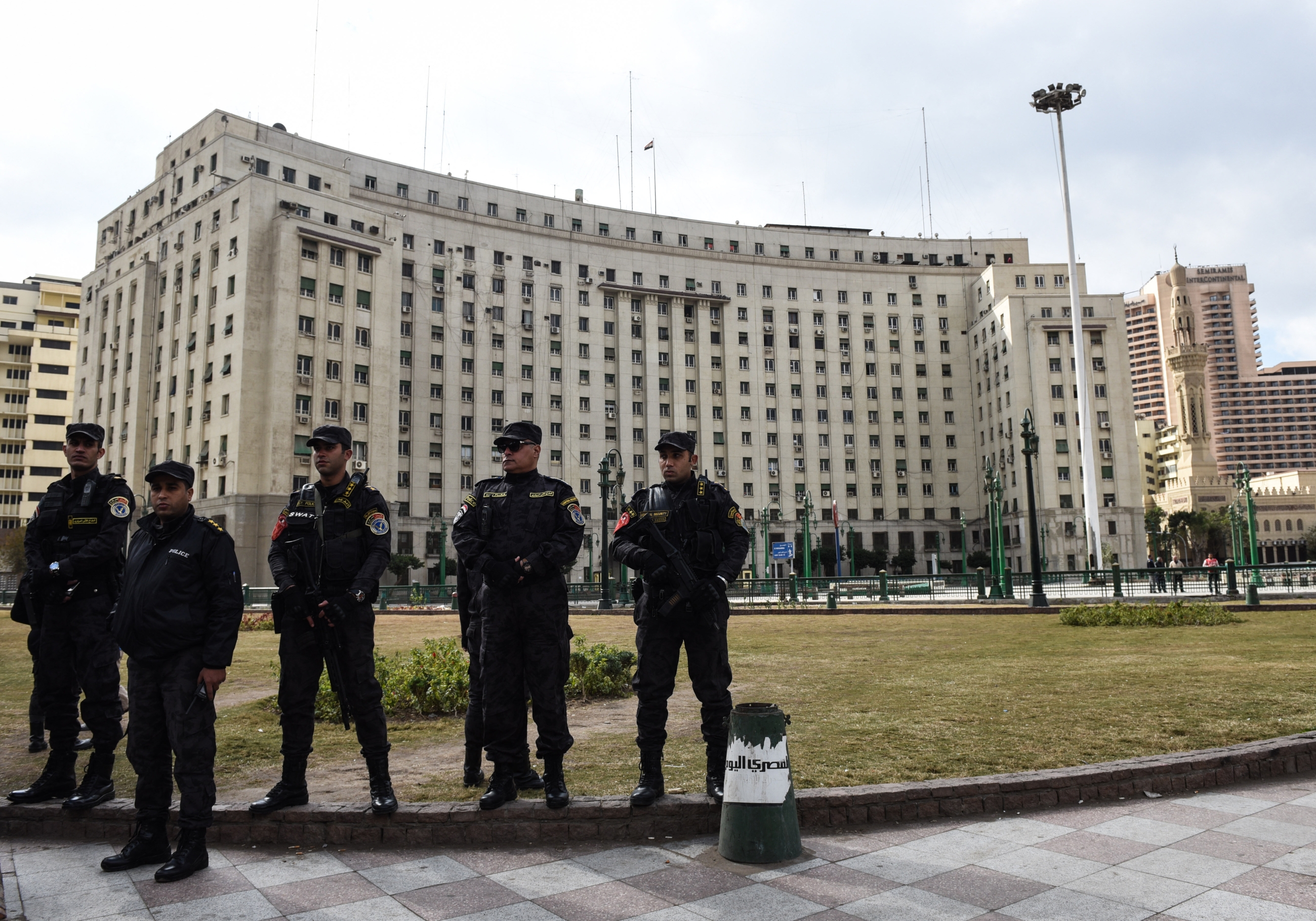
Egypt's oldest administrative building is preparing to depart from its notorious past and welcome its future.
Mogamma el-Tahrir, a gigantic building in the heart of downtown Cairo, will be converted into a luxury hotel, according to a plan unveiled recently by the Egyptian government.
The multimillion-dollar process will see the building become a focal point of foreign investments, only meters away from Tahrir Square, the epicentre of Egypt's 2011 revolution and another episode of the Arab Spring that swept through the Arab region from Tunisia to Syria, beginning in late 2010.
'These changes will help us move ahead with our plan to put the centre of the city on the tourist map'
- Ibrahim Abdel Hadi, Cairo's deputy governor
A consortium of American-Emirati companies won the bid recently to turn Mogamma into a tourist and commercial project.
The deal is worth $225m and will be implemented within the next two years, opening the door for the first partnership with Egypt's Sovereign Fund the investment arm of the Egyptian government, which owns the Mogamma, along with the Egyptian state's other real estate assets which include massive plots of land and buildings across Egypt.
New MEE newsletter: Jerusalem Dispatch
Sign up to get the latest insights and analysis on Israel-Palestine, alongside Turkey Unpacked and other MEE newsletters
"This is an important deal that will add value to one of the most important buildings in Cairo," Cairo's deputy governor, Ibrahim Abdel Hadi, told Middle East Eye. "The Mogamma's location and nature make it fit plans to turn it into a wonderful hotel."
Symbol of administrative failure
For decades, Mogamma el-Tahrir was an icon of Egyptian bureaucracy.
The building's construction began during the last years of the Egyptian monarchy but opened in 1952, a few months after the monarchy was gone. It became an attempt by the authorities of post-monarchy Egypt to simplify administrative procedures by putting all bureaucratic services in one place.
All types of offices for official documentation were in the building and every state institution had an office of representation.
Those who wanted to get birth or death certificates; passports; permission for free medical treatment; criminal records; identification cards; or copies of marriage contracts – among a long list of other official documents – had to go to the Mogamma, regardless of where they lived in Egypt.
However, the attempt to make things easier eventually went awry, as Mogamma turned into an icon of red tape and administrative failure.
Thousands of people trekked through the building's different offices every morning, seeking official documents in what was an arduous trip of bureaucracy that became fodder for films, including Terrorism and Kebbab, a film starring famous Egyptian comedian Adel Emam.
"This building is an example of the government's plans to facilitate administrative procedures backfiring," Hamdi Arafa, an independent administration specialist, told MEE. "Putting all administrative services in one place was a major mistake, turning the Mogamma into a symbol of administrative failure in Egypt."
Unfair competition
Turning the Mogamma into a hotel will be a symbolic move, denoting Egypt's desire to get rid of its old administrative systems.
It is also welcomed in Cairo by economists that see it as the beginning of foreign investments that can add value to some of the old buildings in the Egyptian capital.
"The contract for developing the Mogamma reflects investors confidence in the Egyptian economy," a local newspaper quoted Mohamed Abdullah, the head of the Housing Section at the American Chamber of Commerce in Cairo, as saying.
"The deal also gives insights into the strategy of the Sovereign Fund to get the highest returns from the exploitation of [state] assets," he added.
Nonetheless, the same move is being criticised for bringing in foreign investors into areas where local investors have an edge, which opens the door to unfair competition - especially with Egypt's Sovereign Fund involved.
"This is a bad plan," said Mamdouh Hamza, a renowned architect and an outspoken critic of the Egyptian government.
"If this is a new partnership between the fund and the Emirati-American consortium, it will be catastrophic."
Some economists have also expressed concerns that the fund - which was created by the Egyptian government in 2018 with the aim of gaining maximum benefit from the state's assets and contributing to the transfer of modern technologies to Egypt - will be yet another real estate investment agency that gives investors land and buildings in return for money, leaving them afraid that the investments the fund will bring in will add no value to the economy.
"The fund should be exploiting state assets and transferring technologies through partnerships with local and international players," Khaled al-Shafie, the head of local think tank, Capital Center for Economic Studies and Research, told MEE.
The fund has not mentioned specific details about its partnership with the American-Emirati consortium, but its executive head, Ayman Suleiman, said the consortium would be leased the Mogamma for 49 years after its conversion into a hotel.
However, some economists say the fund will be obliged to sell some of the buildings it owns in order to make available the money it needs for investments in more important sectors like industry, health and education, ones that are not usually coveted by the private sector, which tends to prefer to pursue more profitable investments.
Major attraction
The Mogamma has a strategic location in the heart of downtown Cairo, not far from the Nile River and steps away from a metropolitan area where western architectural styles compete for attention and attest to the diverse culture and history of Cairo.
The multi-story building has hundreds of rooms that used to function as administrative offices.
It is located a few meters away from the Egyptian Museum which houses tens of thousands of ancient Egyptian artefacts.
The Sovereign Fund said part of the building would be converted into a hotel, whereas some parts of the building would be turned into a shopping centre.
"The Mogamma would turn into a bright point in the heart of Cairo," a local newspaper quoted Suleiman as saying.
The front of the building will remain as is, according to Suleiman, while the rest would be renovated to contain hotel apartments, restaurants, and commercial activities.
"These activities will change conditions at the centre of the city altogether," Suleiman added.
Larger plan
Reversing the use of the Mogamma is part of a larger plan to turn downtown Cairo into an open-air museum.
The city centre has seen many changes in the past few years, and Tahrir Square has not been exempt from this process.
Several ram-headed sphinxes were brought from Luxor and placed at the centre of the square. An ancient obelisk was also placed in the middle of the sphinxes, giving the square an ancient touch that makes it match its surroundings.
The buildings of the centre of the Egyptian capital are also being restored to their original conditions, and shops, cafes and restaurants have been ordered to replace signs with ones that are similar to those used at the beginning of the last century.
Some of Cairo's downtown streets have been blocked from traffic, allowing pedestrians the freedom of movement without cars getting in the way.
"These changes will help us move ahead with our plan to put the centre of the city on the tourist map," Abdel Hadi, the deputy governor, said. "It has a large number of ancient buildings that boast the most elevated architectural designs and styles."
Middle East Eye delivers independent and unrivalled coverage and analysis of the Middle East, North Africa and beyond. To learn more about republishing this content and the associated fees, please fill out this form. More about MEE can be found here.


